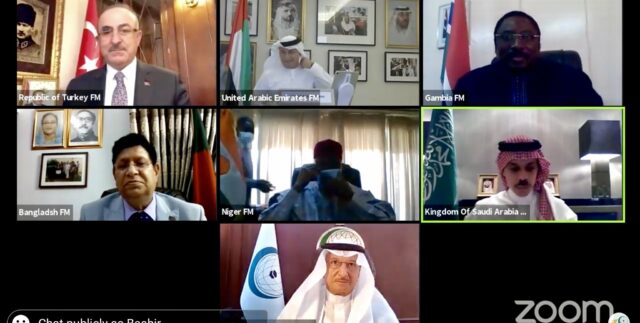NEW DELHI: India has hit out at the Organisation of Islamic Cooperation (OIC) warning it “not to communalise the global fight against the Covid-19 pandemic”, after it issued a statement earlier this week expressing concern over rising Islamophobia in the country.
Sources said on Thursday, “ It is deeply regrettable that the OIC continues to make factually inaccurate and misleading statements…We have demonstrated our resolve to have a coordinated and collaborative approach to fight this pandemic at the global level.”
Sources also saw the tweets put out by a fake Twitter handle being run in the name of Omani princess Mona Al Said as “a deliberate attempt to disturb social harmony in that region and in India.” The tweets from the fake handle prompted the princess to put out a clarification, and a tweet thanking her then came from India’s ambassador to Oman, Munu Mahawar.
The envoy affirmed how important India’s ties with the Gulf nation are. “India values its friendly relations with Oman and will continue working closely with the government and people of Oman to further strengthen our special relationship.”
However, while New Delhi will take the OIC statement in its stride, given the past the two share, it clearly did not expect the backlash it’s had to face in some Gulf countries after some Indian nationals based in the region put out Islamophobic tweets. An old tweet of BJP MP Tejasvi Surya ( he wasn’t an MP then) insulting Arab women too created outrage in the Arab world.
New Delhi’s sharp response to the OIC’s Independent Permanent Human Rights Commission (IPHRC) came after it issued a statement on Sunday urging India “to take urgent steps to stop the growing tide of Islamophobia in India and protect the rights of the persecuted Muslim minority as per its obligations under international HR (human rights) law.”
The IPHRC also condemned the “unrelenting vicious Islamophobic campaign in India maligning Muslims for spread of Covid-19 as well as their negative profiling in media, subjecting them to discrimination & violence with impunity.”
While New Delhi is clearly unhappy with the 57-member OIC’s remarks, it came as no surprise from an organisation that regularly upbraids India on the condition of Muslims here despite the good bilateral relations it has with most of its members. The OIC has also been steadfast in backing Pakistan on Kashmir.
India and the OIC appeared to have moved a significant step forward in their relations last year when the then external affairs minister Sushma Swaraj became the first Indian leader in five decades to address the inaugural session of the 46th OIC meeting of the Council of Foreign Ministers on March 1.
It’s noteworthy though that the invite to be the guest of honour came from the host, the United Arab Emirates (UAE), a country with whom India’s ties have gathered considerable momentum since the prime minister’s visit in August 2015.
















